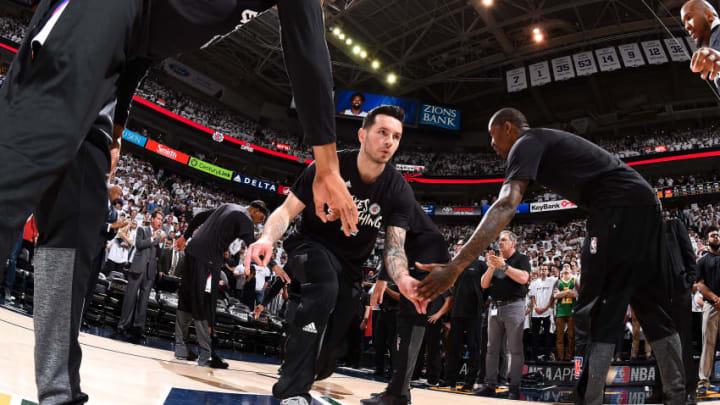J.J. Redick is a limited defender, but the Philadelphia 76ers’ personnel should allow them to overcome those limitations.
Defense is as important as ever. Even in an era characterized by high-octane offenses and a pace-and-space dynamic, teams need to be able to defend in order to compete. The Golden State Warriors are among the league’s most effective defensive teams, while a team who can’t contain them — say, the Cleveland Cavaliers — have no shot at winning in a seven game series, regardless of their own offensive success.

Philadelphia 76ers
If a team isn’t good on both sides of the ball, they’re at an immediate disadvantage against upper echelon competition. The Philadelphia 76ers should be in good standing.
During Joel Embiid’s time on the court last season, the Sixers were already among the league’s better defensive teams. Even when limited to 26 minutes per game, Embiid flashed nothing shy of elite defense. He blocked 2.5 shots per game, while his combination of size and mobility allowed him to cover ground and sniff out plays like few bigs can.
He was also accompanied by Robert Covington, who led the Sixers in steals and blocks when factoring Embiid out of the equation. Covington quietly finished fourth in the Defensive Player of the Year conversation, affording the Sixers one of the league’s best perimeter defenders in accompaniment to a center whose defensive prowess was only out-shined by Rudy Gobert at that position.
Brett Brown has always stressed defense above all else, and their personnel is indicative of one of the best defensive units in the league. Even Markelle Fultz and Ben Simmons, who were mediocre collegiate defenders, give them more versatility in roles that should be more conducive to two-way success.
The one weak link in that setup — under the assumption that Fultz and Simmons do show improvement — is J.J. Redick.
The 33-year-old signed a one-year, $23 million contract this offseason. He’s not only the most lucratively signed player on the roster, but boasts a level of offensive importance that has flown under the radar a bit too much amidst the hype surrounding the SIxers’ young core.
Must Read: Marvin Bagley's reclassification could help the Sixers'
His defense, however, is something Brett Brown will need to address. While he’s not bad fundamentally, his lack of size and length at the two spot caps his ceiling when facing superior, or larger, players on the perimeter. He’s not a great athlete either, which limits his ability to stick with quicker guards off the bounce.
There’s some obvious concern there, but it’s nothing that should concern fans to an extended degree. Embiid’s rim protection is a virtual safety net for the perimeter defenders placed around him, while Covington and Fultz have the size and athleticism needed to take on the opposition’s best offensive players when needed.
Redick can be hidden on the weakest link, while Embiid puts a blanket limit on guards’ effectiveness when driving the lane. Philadelphia covered up the deficiencies of Nik Stauskas and Dario Saric last season, and Redick could feasibly be a step up.
Next: Markelle Fultz is the best guard prospect since Kyrie Irving
The Sixers are set up for long term defensive success, and any concerns over Redick’s defense should be minimal — if existent at all.
